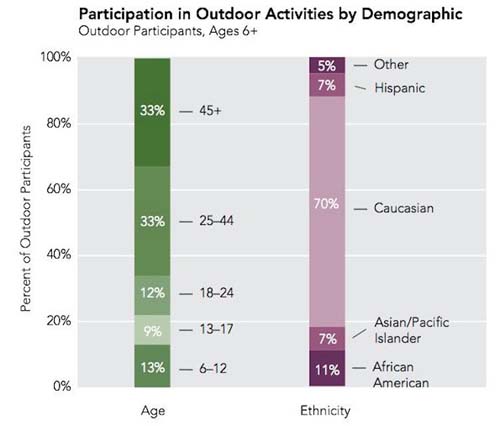White People Love Hiking. Minorities Don’t. Here’s Why.
Ryan Kearney, New Republic, September 6, 2013
White people simply love to spend their free time walking up and down mountains and sleeping in the forest. Search “hiking” in Google Images and see how far you have to scroll to find a nonwhite person. Ditto rock climbing, kayaking, canoeing, and so on. That white people love the outdoors is so widely accepted as fact that it’s become a running joke. The website Stuff White People Like has no less than three entries on the subject: “Making you feel bad about not going outside” (#9), “Outdoor Performance Clothes” (#87), and “Camping” (#128). The latter entry reads, “If you find yourself trapped in the middle of the woods without electricity, running water, or a car you would likely describe that situation as a ‘nightmare’ or ‘a worse case scenario like after plane crash or something.’ White people refer to it as ‘camping.'”
That quote is almost certainly how most blacks, Latinos, and other minorities view hiking and camping. The Outdoor Industry Association — the top outdoor-recreation lobby in America (and based in Boulder, naturally) — insists that outdoor enthusiasts “are all genders, ages, shapes, sizes, ethnicities and income levels,” but research by their own nonprofit organization, The Outdoor Foundation, shows underwhelming diversity. Its 2013 outdoor participation report notes that last year, 70 percent of participants were white. “As minority groups make up a larger share of the population and are predicted to become the majority by 2040, engaging diverse populations in outdoor recreation has never been more critical,” the report reads. “Unfortunately, minorities still lag behind in outdoor participation.”
{snip}
As Stuff White People Like says, “In theory camping should be a very inexpensive activity since you are literally sleeping on the ground. But as with everything in white culture, the more simple it appears the more expensive it actually is.” You may need to fly to your destination; otherwise, you’ll need a car and a full tank of gas. A backpack, tent, and the necessary gear will run you at least $1,000. And then you need some free time — which, if you work two jobs, you probably don’t have. That may explain why 40 percent of outdoor participants come from households with incomes of $75,000 or more, according to the Outdoor Foundation’s report.
{snip}
{snip} Yes, there are economic barriers, but the cultural ramifications of those economic barriers are more devastating, as they ripple across generations. Say you’re a black teenager in Washington, D.C., or a Hispanic teenager in Denver. Statistically, there’s a good chance you have never been to Shenandoah National Park or Rocky Mountain National Park, respectively, because your parents had neither the means nor the interest. Then you grow up, get a good job, and enter a higher income bracket. Why on Earth would you use your hard-earned vacation time to spend a week eating freeze-dried food in the woods — rather than, say, reclining at a seaside hotel on Miami Beach, frozen margarita in hand?
Even I can’t answer that question — not without embodying the parody of a white man, anyway.
















